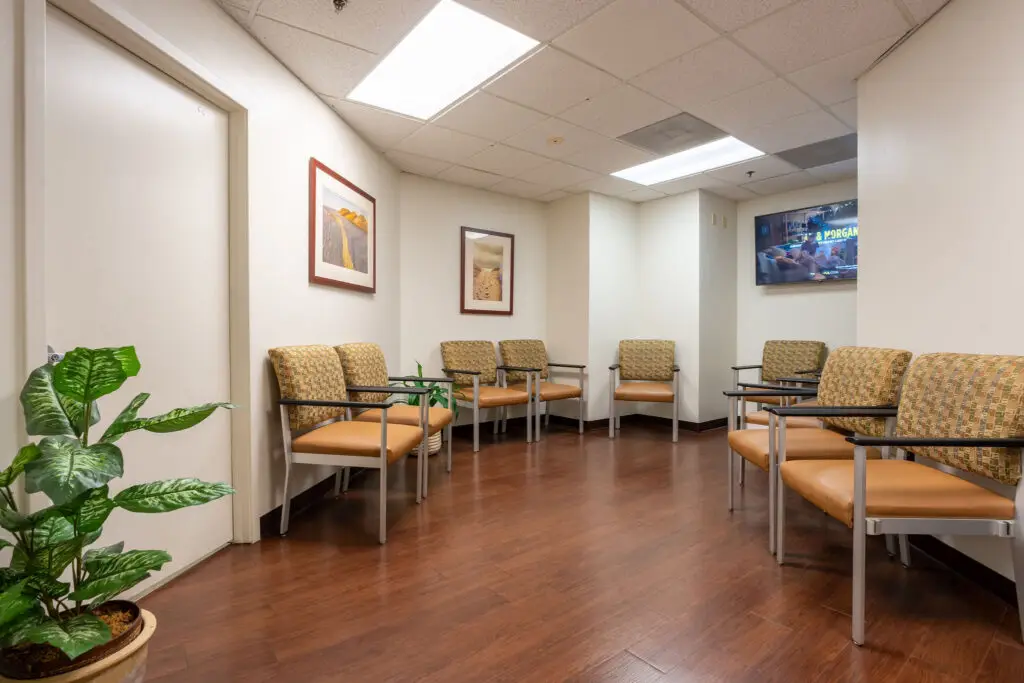Inpatient rehab offers intensive, life-changing addiction treatment that helps you escape triggering environments and focus on your recovery. It’s time to get your life back.
Following inpatient rehab, the partial hospitalization program (PHP) at our Palm Beach facility offers a balanced approach between intensive inpatient care and the independence offered by outpatient care. At The Recovery Village at Baptist Health, PHP empowers patients by providing necessary medical assistance and developing crucial skills for maintaining sobriety.

If any of the following apply to you, your clinical team may suggest transitioning to PHP as part of your care:
After completing inpatient treatment, entering our PHP level of care is the first step towards rebuilding your independence and reentering the community.
Typically, PHP patients at our Palm Beach location participate in individual counseling sessions once a week and engage in group treatments six days a week. Our dedicated medical staff addresses your physical, mental, and social needs to develop a personalized treatment plan that incorporates evidence-based therapies and recreational activities, empowering your recovery journey each day.

Speak with a Recovery Advocate who can answer your questions and get you started on your recovery journey.
Partial hospitalization refers to an intensive, short-term form of addiction treatment that is less intense than inpatient rehabilitation or residential treatment but is a higher level of care than outpatient treatment. A PHP can directly follow inpatient or residential treatment, or it can be a starting point for the recovery process. Though it varies by facility, clients often live on-site at this phase of treatment. As the first treatment after inpatient rehabilitation, PHP can be an integral part of a return to living outside of a controlled environment. It can help establish a healthy rhythm for daily life. PHPs can offer a large variety of treatment services and features, including:
Usually, PHPs are utilized in a recovery, psychiatric or acute medical setting, and can be an effective way to balance treatment and skills application.
Clients enrolled in a PHP engage in evidence-based treatment for approximately 18–20 hours per week and for five to seven days a week. A primary goal of PHP is creating a balanced transition towards independence. The highly structured support of PHP means that medical treatment and counseling support are readily available, while the freedom of PHP also provides many recreational amenities and therapeutic endeavors.
Although program offerings vary among rehab centers, most PHPs offer a daily partial hospitalization program schedule that includes medical support, counseling and access to therapeutic amenities.
At The Recovery Village Palm Beach at Baptist Health, our PHP includes:
Clients have access to support while they are beginning to live with less structured care than inpatient or detox. As clients develop skills for sobriety and self-confidence as they progress through PHP, they can transition to intensive outpatient care. The Recovery Village Palm Beach at Baptist Health’s nearby outpatient center hosts daily programming for partial hospitalization and other clients. Intensive outpatient care follows PHP at The Recovery Village Palm Beach at Baptist Health, meaning that familiar faces and environments can help ease clients’ transitions to further programming in the same facility.
Medical detox is not included in the PHP program. Individuals requiring medical detox can complete this program separately before beginning the PHP phase of treatment.
The importance of completing your entire treatment plan cannot be overstated, as leaving treatment early can significantly increase the risk of relapse and overdose. Nevertheless, patients may choose to leave treatment, even against medical advice, as long as they are not a danger to themselves or others.
Yes, PHPs play a crucial role in helping patients move from the structured environment of inpatient treatment to a more independent lifestyle in outpatient care. This pivotal phase ensures that patients receive the appropriate level of medical support while gradually fostering their autonomy. A seamless transition is essential to mitigate the risks of relapse, overdose, and other challenging consequences.
Insurance coverage for PHP treatment can vary; some or all of the costs may be covered by your plan. However, copays and meeting deductibles may still be necessary. Without insurance, private payment plans are also available.
There are several laws in place that protect employees when they attend rehab.
Taking the necessary steps to address your addiction is instrumental in securing a better future for your children. Although there are no guarantees regarding child custody, completing rehab can reduce the effects of addiction on your life and can make you more likely to maintain custody of your children.
Speak with a Recovery Advocate who can answer your questions and get you started on your recovery journey.

The Recovery Village at Baptist Health offers comprehensive addiction treatment for drug and alcohol addictions and co-occurring mental health conditions. Read more
Medical Disclaimer: The Recovery Village aims to improve the quality of life for people struggling with a substance use or mental health disorder with fact-based content about the nature of behavioral health conditions, treatment options and their related outcomes. We publish material that is researched, cited, edited and reviewed by licensed medical professionals. The information we provide is not intended to be a substitute for professional medical advice, diagnosis or treatment. It should not be used in place of the advice of your physician or other qualified healthcare provider.